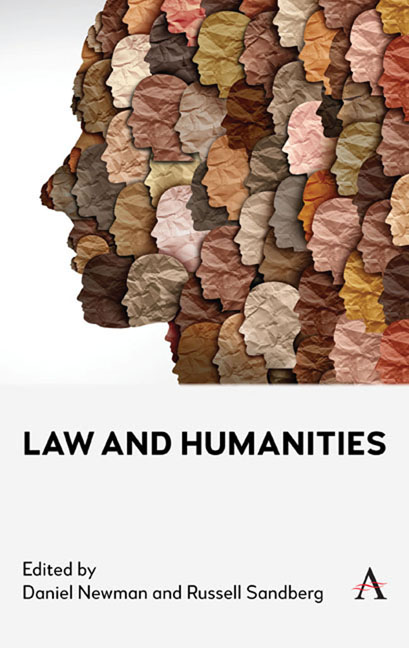Book contents
- Frontmatter
- Contents
- Preface
- List of Contributors
- Chapter One Introducing Law and Humanities
- Chapter Two Law and Archaeology
- Chapter Three Law and Comics/Graphic Justice
- Chapter Four Law and Film
- Chapter Five Law and Geography
- Chapter Six Law and History
- Chapter Seven Law and Literature
- Chapter Eight Law and Philosophy
- Chapter Nine Law and Popular Music
- Chapter Ten Law and Religion
- Chapter Eleven Law and Television
- Chapter Twelve Law and Theatre
- Chapter Thirteen Law and Theology
- Chapter Fourteen Law and Video Games
- Chapter Fifteen Conclusion: Subverting the Law and Humanities Canon
- Index
Chapter Six - Law and History
Published online by Cambridge University Press: 27 March 2024
- Frontmatter
- Contents
- Preface
- List of Contributors
- Chapter One Introducing Law and Humanities
- Chapter Two Law and Archaeology
- Chapter Three Law and Comics/Graphic Justice
- Chapter Four Law and Film
- Chapter Five Law and Geography
- Chapter Six Law and History
- Chapter Seven Law and Literature
- Chapter Eight Law and Philosophy
- Chapter Nine Law and Popular Music
- Chapter Ten Law and Religion
- Chapter Eleven Law and Television
- Chapter Twelve Law and Theatre
- Chapter Thirteen Law and Theology
- Chapter Fourteen Law and Video Games
- Chapter Fifteen Conclusion: Subverting the Law and Humanities Canon
- Index
Summary
Introduction: The Paradox of Law and History
Paradoxically, history is both everywhere and nowhere in legal education. On the one hand, history is ubiquitous in law schools: most lectures and textbook chapters explore how a case law has evolved over time and students are used to citing legal materials penned centuries ago. Yet, on the other hand, history is often missing in legal study: students are not interested in the time and context in which the cases occurred; they are solely concerned with their relevance in terms of their task of determining what the law is now so that they can critique the law within its own terms in an essay question, apply it to an idealised if often embellished factual scenario to answer a problem question or memorise it as if it was trivia for the purpose of succeeding at a multiple choice test. As the legal historian Frederic William Maitland put it in his 1888 inaugural lecture at Cambridge, ‘what the lawyer wants is authority and the newer the better; what the historian wants is evidence and older the better’.
This paradox has affected the development of law and history as a subject of study. On the one hand, there is a magnitude of research that explores the development of law over time, often with an eye on the social, political and cultural contexts. Yet, on the other hand, the number of academics who identify primarily as experts in this field, as legal historians, is much smaller. There is, of course, significant variation from jurisdiction to jurisdiction. History seems to be taught more in civil law jurisdictions generally; within common law jurisdictions the development of legal history as a subject is more advanced in the United States. There are also differences within jurisdictions. In England and Wales (which will be the focus of this chapter), a great deal of work that could be seen as coming under the umbrella of law and history has and is completed outside of law schools. History departments formerly led the way in terms of constitutional history, and more recently their attention has shifted to social history, which includes a significant focus on legal matters.
- Type
- Chapter
- Information
- Law and Humanities , pp. 87 - 100Publisher: Anthem PressPrint publication year: 2024

